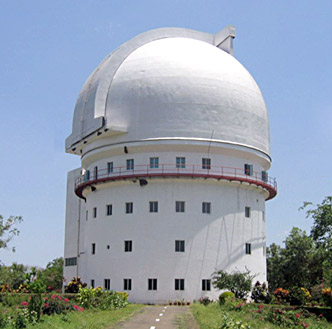June 17, 2012
As the evening session of a mostly rainy Sunday progresses outside, I will note a few things about Vainu Bappu. Manorama newspaper was considerate enough to remind Keralites about him on his 30th death anniversary with the Sunday supplement's cover feature dedication.
Not many know that this father of modern Indian astronomy is a Malayalee. Well, he is a Malayalee much like how M. Night Shyamalan is a Malayalee. Venu Bappu was born in Madras and raised in Hyderabad. But his parents were from Thalassery and his wife, Yamuna, who is alive and well, is from Mayyazhi.
His dad used to work for Nizamia observatory, Hyderabad and was a believer in numerology. Hence the spelling switch to Vainu for his son, Venu. A brilliant student, Bappu managed to get his findings to Sir Harold Spencer Johns of Harvard when he visited India. Impressed, Sir Harold made sure that Mr. Bappu made it to Harvard on a scholarship in 1949.
There with his fellow researcher, Olin Wilson, Dr. Bappu discovered the Bappu-Bok-Newkrick comet. In 1957 came Wilson-Bappu effect that opened up the field of stellar chromospheres, as wikipedia puts it.
By 1951, he received Carnegie fellowship and a chance to work at the 200 inch telescope at Palomar. He was 24!
But Dr. Bappu decided to be back in newly independent India, a land with an illustrious tradition of original astronomy that had unfortunately decayed over the centuries into the unscientific business of astrology. Starting with the observatories in UP and Nainital, he went on to establish the Indian Institute of Astrophysics 1971.
Following his untimely death at the age of 55, the government honored him by naming India's largest optical telescope, the 90 inch one, at Kavalur, Tamil Nadu after him.
Manorama article discusses several endearing traits of the man who loved children and worked hard to inculcate a reading habit in them. His passion for science can be instantly recognized from the anecdote about the 16 km bicycle trips he made on each day to attend a three day seminar by Sir C.V. Raman.
Thiruvananthapuram is a city of many 'moods'. There is Pla-mood, Puli-mood, Arassu-mood, Naruva-mood and so on. Venjara-mood has practically become the wider city limit these days. This Malayalam 'mood' can be roughly translated as the 'base' but then these days that word has the sinister al-Queda twist. Once upon a time, the little hamlets in these parts must have been defined by those trees: Pla (jackfruit), Puli (tamarind), Arassu (Peepal). I am stumped about what Naruva is. In Divehi language of Maldives, the word means the cardinal creeper with deep red flowers that humming birds love.
Walking in the zoo and museum campus after rain this morning, I realized that I love shapeless trees. Perhaps they remind my brain of itself: thick in parts, twisted at others, dropping roots and vines all over the place, green, brown and a handful of flowers!
A family of lion-tailed macaques were celebrating the diffused cloudy morning light on a tree within the zoo premises that was a bit too close to the compound wall for comfort. Took a couple of snaps. They noticed and obliged with a pose. Typical celebrities!
Walking a round of the Kanakakunnu Palace, thought I saw a film actress. Once while having dinner at Taj in College Station, Sharath B's sis had mentioned that this actress was her friend. I would have confirmed if she hadn't insisted on keeping her head down and headphones plugged in while frantically burning off a generous posterior today.
Three ladies, with costumes giving away their varying degree of commitment to the morning exercise, one in saree, second in churidaar and the third in track suit, crossed the aforementioned actress and recognized her. By the time they reached me, walking 10 meters of so behind the aforementioned posterior, they dropped the comment: "Veluppankalathu thanne enthoru facewashinte manam kanda!" (Look how much she smells of facewash early in the morning itself)
Bappu's wife fondly remembers him as a man who seemed never to get angry. I guess a mind that has opened itself to the infinity of space, would hardly fret about the ephemeral affairs of men.


No comments:
Post a Comment